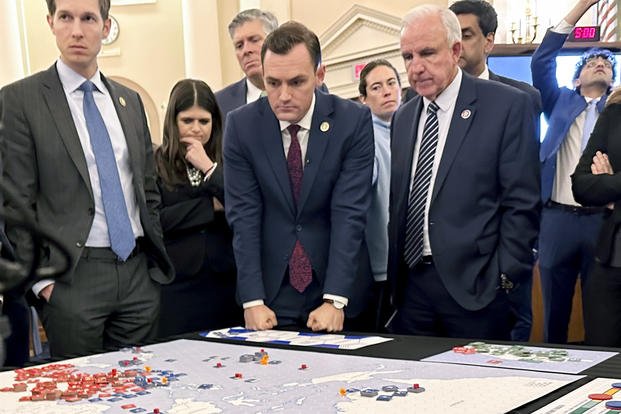The U.S. military should do more to deter China from invading Taiwan and to prepare for a war if deterrence fails, including expanding joint military exercises with Taiwan and hardening U.S. bases in the region, a House committee said in a bipartisan report released Wednesday.
The report, one of the first concrete products from a committee created this year to focus on U.S. competition with China, comes after the panel conducted a war game last month that acted out a hypothetical Chinese invasion of Taiwan.
Rep. Mike Gallagher, R-Wis., during a committee meeting Wednesday to approve the report, asked the public to imagine 80,000 Chinese troops on Taiwan, U.S. military runways on Guam destroyed and other catastrophic fallout from a theoretical conflict.
Read Next: Army Special Operations Could Be Cut 10% as Military Looks to Conventional Warfare
"Dozens of our F-35s vaporized. Our long-range munitions largely depleted in just six days. Financial markets tanking. Chinese banks kicked off the SWIFT [Society for Worldwide Interbank Financial Telecommunication] system. Shipping insurance halted. Global trade frozen," said Gallagher, the chairman of what is formally known as the Select Committee on the Strategic Competition Between the United States and the Chinese Communist Party.
"At the select committee's tabletop exercise, we saw the terrifying result of deterrence failure," he continued. "Today is about doing what we can to make sure that that game stays fictional."
Lawmakers in recent years have pushed to increase support for Taiwan as fears grow that China could invade what it views as a breakaway province in the near future.
Last year's annual defense policy bill included several provisions intended to bolster Taiwan's defenses, including calling for a "comprehensive training program" between the U.S. and Taiwanese militaries, but lawmakers say there's more work to do to ensure Taiwan gets the training and weapons it needs.
The report released Wednesday recommends expanding the combined U.S.-Taiwanese military exercises. Congress should build on the training provision in last year's defense bill, the report says, by "promoting the expansion of combined training and exercises, including annual tabletop exercises and operational training with U.S. air, maritime, and special operations forces and U.S. National Guard units, to build trust, improve Taiwan's self-defense capabilities, and strengthen interoperability and integration in key operational areas."
The recommendation on training is one of 10 included in the 15-page report, which Gallagher and committee ranking member Rep. Raja Krishnamoorthi, D-Ill., both said will not be the committee's final word on the subject of Taiwan.
The report also calls for creating a "U.S.-Taiwan Combined Planning Group" so the two militaries can have closer communications and better coordinate contingency planning and arms sales.
U.S. military bases in the Indo-Pacific region should also be strengthened against the possibility of a Chinese attack, the report said, including by distributing U.S. forces across more allied and partnered nations. Congress should also help with the goal of strengthening U.S. military bases by providing more funding for "passive defenses" such as hardened fuel depots, the report says.
Other recommendations for the military include more clearly defining the command-and-control structure in the Indo-Pacific. Last year's defense policy bill requires the Pentagon to establish a joint force headquarters in the region. But the report expressed concern that the department considers a two-star command focused on Guam as fulfilling the requirement, while lawmakers believe their original intent of "establishing a crisis response chain of command" is still unmet.
The report also touches on improving Taiwan's cybersecurity, speeding up weapons deliveries to Taiwan, and increasing production of U.S. weapons.
Committee members aim to include at least some of the recommendations in the annual defense policy bill that the House Armed Services Committee is expected to begin debating next month. Gallagher also serves on Armed Services, as do several other members of the China committee.
Some recommendations, particularly those related to arms sales, may not make it into the Armed Services Committee's draft of the National Defense Authorization Act, or NDAA, because of committee jurisdictional issues, but Gallagher expressed hope other recommendations will be in the defense bill.
"When it comes to, for example, the command structure in the Indo-Pacific and ensuring that it's appropriately prioritized at the right level with a four-star and not a two-star, let's say, I'm confident we'll get something in the NDAA," Gallagher told reporters after Wednesday's meeting. "When it comes to the necessity of long-range precision fires and some of the efforts to energize a munitions industrial base, I'm cautiously optimistic we'll get something in the NDAA. So, we've identified a pathway for most of the recommendations."
-- Rebecca Kheel can be reached at rebecca.kheel@military.com. Follow her on Twitter @reporterkheel.
Related: Lawmakers Want to Increase Military Training for Taiwan as Tensions with China Intensify












